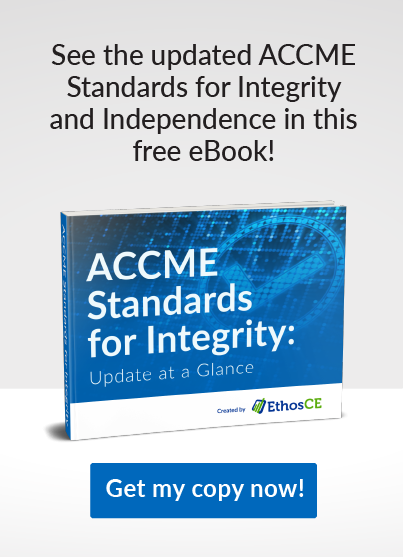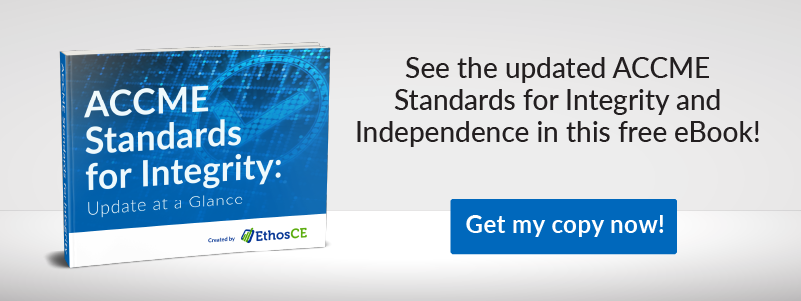9 Standards for Integrity Questions Answered
The new updates to the ACCME’s Standards for Integrity and Independence in Accredited Continuing Education have changed things for accredited CE providers, directors, and coordinators who manage continuing education programs. Released on December 10, 2020, the Standards must be in place by January 2022.
When planning and implementing the Standards, you may be facing challenges and even asking yourself where to begin. To start, the ACCME has released a comprehensive information package and a toolkit, which are great places to start.
Standards for integrity questions? We have answers.
As providers, you probably have many standards for integrity questions. Here, we share the Q&A from our recent webinar hosted by EthosCE’s Ezra Wolfe and CadmiumCD’s George Heitzman. They and their panel of experts discussed the changes surrounding the ACCME’s Standards, as well as how to level up your CME and understand these commercial support standards. The webinar also featured attendee questions from those who want to know exactly what they need to do.
1. What’s new?
The ACCME received a great deal of positive feedback from other accreditors with the release of the new Standards. They represent a change from the numbered criteria to a reorganization that makes more sense, based on community feedback to feature more scripted names.
Standards 1-3 are explicitly intended for all providers, regardless of the type of education that they do. Standards 4-5 are intended for those providers that engage in commercial support or ancillary activities.
The Standards also demonstrate new structural revisions and terms, including a new name to reflect them and the subsequent change in spirit and intent. Here is what’s new:
- Content validity
- No sales or marketing
- Identification, mitigation, and disclosure of financial relationships
- Ancillary marketing and nonaccredited activities
Now, let’s look at the webinar attendee questions.
2. What is being shown to the learners in terms of financial disclosures?
Financial disclosures are what providers in medical specialties are finding challenges with. They tend to do large conferences and annual meetings and often have to deal with presentations and scientific abstract submissions. There could be around 2,000 of those in one meeting alone. There’s so much information that has to be disclosed and so much more that a provider or planner has to go through. They must develop a process that works and isn’t restrictive, but it can be time-consuming, laborious, and cumbersome.
3. If providers are collecting all this information but are only disclosing to learners the relevant relationships, at the time of re-accreditation, will they disclose what was initially disclosed on the disclosure form, like all the relevant relationships to the ACCME, or just the distilled relevant ones of those who control content? For example, if you’re getting your larger list, Subset A, and you’re getting down to Subset B, is ACCME going to collect both sets of data and do something with that?
It’s unlikely that ACCME is going to do that. What’s important is that you’ll have a process in place to collect all those relationships, mitigate those that are not relevant, and disclose those that are pertinent to the activity and relevant to the learners. ACCME will look for your process and what you showed the learner.
4. What happens if there are many disclosures?
Disclosures will change as you add new speakers and faculty. You’ll need to be vigilant and diligent. If a relationship is mitigated after twenty-four months, then it’s ended. If it’s mitigated, it’s resolved. All you have to say is that it’s terminated.
5. What about the disclosure form templates?
The brand-new templates are quite helpful. Everyone should take a look at those. They can be found in the new ACCME toolkit, which has everything that you need to know about your standards for integrity questions.
6. When does the twenty-four-month window start? If you are collecting disclosures every year involving your faculty, is this still a valid practice? How does your twenty-four-month process change?
The process of disclosure every twenty-four months is common, but as a provider, you can take various methods of obtaining disclosures. You could collect them periodically, like annually, bi-annually, or even once every ten years. What’s important is that they’re updated and correct at the time that the person begins to take control of the content. For example, if you’re planning an activity that’s going to take place a year from now, you need to be aware of all the relationships that you have engaged in during the twenty-four months prior to the day that you start planning. If you got that information a year ago, there should be a caveat that says that if something changes, they should let you, as the provider, know twenty-four months before the planning takes place. All the ACCME wants is to know that the disclosures are the most recent ones.
7. What is the standing regarding ancillary and non-accredited marketing in the educational space, whether it’s online or hybrid or both? How does the thirty-minute rule play into this?
Many learners will see many marketing messages online and in hybrid educational spaces. A learner may ask if they should be exposed to promotions without being able to opt out. Learners should be able to make choices in these spaces as they would in exhibitions.
If your learners come in good faith to an educational space or an activity, they shouldn’t be subjected to an intentionally promotional educational activity unless they choose to do so. Even if they find that there is great information from X company or Y company, they should still be able to get up and leave as they would in an exhibition hall.
You can have a link for promotional messaging in your activity, but it cannot contain logos. It can be something that says, “Hey, here’s interesting information from/about X, click on this link.” Learners can then decide whether they want to engage in the marketing activity, as they would in a live exhibition hall.
If a provider has a virtual platform, what if they have a link from volunteers from special interest groups, like “Women in Cardiology”? Is this permissible?
In this instance, it’s permissible to allow this when the link says something like, “Here is a recording about such-and-such from the Women in Cardiology special interest group.” It’s not promotional, so there is no issue.
8. What if a learner opts out of sharing their data at the time of their registration for an in-person event registration but then allows an exhibitor to scan their badge, forgetting that they’ve opted out. The exhibitor approaches the provider and asks if they can have the names of all those whose badges they scanned, so they can market to them. Is this equivalent to giving permission, or because they went on record and opted out, would the provider have to say no?
It was implied to the learner that by having their badge scanned, they were allowing their information to be collected. Learners should expect that their information will be collected in this manner.
Does the provider have to go into their database? Scanning the learner’s badge means they will be contacted. The provider would be asked to explain what happened. There should be a disclaimer on the badge.
9. Rather than go through the process of disclosure review, you just collected all the disclosures. What would happen if you supplied all the disclosures to everybody? Do you have to use which ones are relevant, or can you just display all of them?
Looking at what’s on the paper, it still has to be on paper. You would still need to go through the reviewing and mitigation processes and determine if the information is relevant.
Could you just get everyone’s information and just disclose that? Some organizations do all disclosures because they believe in transparency. There are principles at play here. Are you getting all the relationships, are you mitigating all those that are relevant, and are you disclosing the relevant relationships to your learners? If that’s happening, then you have met the expectation. If you say, “I’m going to mitigate, I’m going to figure out what ones are relevant and mitigate those, but then I’m going to disclose everything,” then you wouldn’t be violating the letter of the requirement.
Suppose that you have thirty relationships, and you talk about X issue with them. You also have relationships among 300 other presenters and planners that have nothing to do with that issue, many of whom are in similar situations. Are you helping the learner by giving them that information, through which they have to search for the relevant details?
Basically, you, as a provider, should collect everything, mitigate what’s relevant, disclose to learners the presence or absence of relevant financial relationships, and include a statement that says that all relevant information has been mitigated. If you’re able to demonstrate these things, you can show that you are in compliance.
What should you do?
The webinar’s panel highly recommends that you should get started right now. January 2022 will be here before you know it.
You need to come up with a process that works, so you should use your valuable time wisely. There is still time to work out the kinks between now and January.
If you have more standards for integrity questions, the ACCME has published a toolkit that contains everything that you need to get started, as well as a Resources page to provide you with more helpful information.
To learn more about the Standards for Integrity and Independence in Accredited Continuing Education and how they apply to you, click here to watch the recorded version of the webinar, entitled, “Navigating the ACCME Commercial Support Update.”
At EthosCE, we understand the challenges of staying up to date and compliant with ACCME changes. We know how critical it is to get things done right the first time when it comes to team-based education and success.
To learn how EthosCE can enhance the continuing education of your healthcare teams, schedule a free 1-on-1 demo with one of our specialists today!
 We're now part of the Cadmium product suite! Learn more
We're now part of the Cadmium product suite! Learn more 


